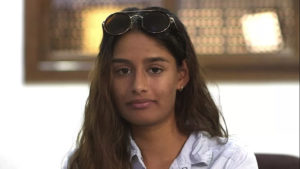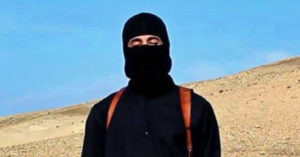“Send the money now brother, we can’t wait. We are living with the Kafir [infidel] pigs.” This was one of hundreds of text messages I received in 2020 from Isis women living in Syria’s miserable al-Hol prison camp. As part of an investigation into Isis’s finances, I was posing as a lapsed British Muslim who had read about their plight and wanted to help.
The women did not hold back. Every day I turned on my phone to a deluge of Isis slogans, religious memes and terror threats. Images of destroyed western cities were particularly popular. I was told that terrorists such as Dzhokhar Tsarnaev (the Boston bomber) were heroes. My new contacts would make jokes about blowing up London. They bantered about beheadings.
These women had been holed up in the Kurdish-run desert camp since the fall of Baghouz, the last Isis enclave, in March 2019. They wanted money — and were getting it. With the help of Isis women who had already managed to return to the EU or Turkey, they were spearheading a fundraising campaign to “free the sisters” from the Kurds. Their rhetoric was typically fiery, and the groups used encrypted apps such as Telegram to organise donations. Since then, I’ve watched as their language has softened — and begun to poison the West’s mainstream media.
Around the beginning of the pandemic, family and friends of Isis members began to gently craft a new narrative about their women. They had never supported the caliphate. They were innocents forced to travel there by men. They were, in their own way, victims. These grown women had been “trafficked” into Isis territory. Ignore the fact that many of them bought their own tickets.
This narrative was being peddled by a cluster of online groups, which had sympathetic names such as “Repatriate the Children”. The funding behind them is questionable: in Ukraine, where I am now, some organisations supporting Isis families were connected to Russia. Most claimed to be primarily concerned with the wellbeing of minors, many of whom had been born in Isis territory, were injured and, yes, should have been repatriated — albeit to countries many of them had never even visited. But soon the remit of these groups broadened. They began to speak of “women and children” in a Syrian “refugee camp”.
A number of NGOs have fallen for this narrative — as has the Western media. Where reports once condemned evil Isis brides joking about beheadings, now they depict the plight of innocent Isis brides who just want to come home after a terrible ordeal. Last month, the New York Times ran an article on the repatriation of Australian Isis families headlined: “After years of ‘Hell’ in Isis Detention Camp, 17 Australians Return Home”. The story celebrated the return of 13 children, as well as four grown women who were almost certainly committed to Isis once, even if they aren’t anymore. It also featured comment from the ecstatic patriarch of a large Sydney-based family from which several adults have fled to join the caliphate. There was no mention of those for whom Isis made life “Hell”: the Yazidis, who were brutally enslaved, and the Kurds.
This NYT report appears to be the result of three years of lobbying to ensure that anyone who makes the terror group look bad is utterly erased. The truth is, the women of Isis are rarely passive victims. I have visited the section of al-Hol that houses foreign women and children several times. It is many things, but it is certainly not a refugee camp, unless the women are refugees from a terror state many of them travelled thousands of kilometres to join. It is a prison camp full of inmates who support an extremely dangerous ideology. (That’s not to say the camp doesn’t deserve criticism: the conditions are inhumane, and children in particular should never have to experience them.)
The first Isis “bride” I encountered, shortly after Baghouz fell, was a woman in niqab who started to shout, condemning me and everyone from my country for destroying the caliphate. More women gathered around us, triggering a ritual with which I would become quite familiar: exhausted Kurdish women from the YPG, a group that not only fought Isis but were then tasked with guarding them, brandishing their AK47s and telling me to move. I was “exciting” the inmates, who, I was warned, could become aggressive. During my visits, I saw women making beheading gestures. They often spat at our feet.
My observations weren’t unusual. Colleagues ran headlines describing the camps as “toxic” and the inmates as “radicalised”. Women screamed on camera about the glorious legacy of Isis ideology and scoffed that they would never go to prison. The Guardian described al-Hol as an “incubator for Islamic State resurgence”, and reported several brutal murders carried out inside the camp.
But a year after the fall of the caliphate, Covid-19 raged across continents, and foreign correspondents with experience in Syria were refocused. The international news cycle was now in a furious pandemic-obsessed spin. Pro-Isis lobby groups saw their opportunity — and started to change tack.
Women inside the camps were instructed to tone down their language. Twitter accounts that had previously called for the beheading of journalists like me now took a more humanitarian approach. And it wasn’t long before NGOs adopted this rhetoric. Human Rights Watch started to issue press releases with titles such as “’Bring me back to Canada’: plight of Canadians held in Syria for alleged Isis links”. That particular publication includes quotes from Kimberly Poleman (“Let me be who I am, a Canadian”), who met an Isis fighter online and travelled to the caliphate in 2015. A year earlier, Isis’s Yazidi genocide of August 2014 had been well-documented. Poleman could hardly claim to be ignorant about the crimes of the organisation she was going to support.
But, disturbingly, Yazidis, Kurds and the caliphate have slipped out of NGO press releases, which instead focus on the rights of foreigners held in “filthy conditions”. Meanwhile, aid organisations have reduced their services in the Yazidi camps in Iraqi Kurdistan. Yazidi girls held as sex slaves by Isis receive messages on social media apps from Isis supporters telling them they are coming back to get them. Some girls refuse to leave the sprawling, under-resourced camps for this reason. Meanwhile, young Yazidi boys, having been groomed by Isis to fight and dig tunnels in Mosul, spend their days shooting things in online games. Many local aid workers are terrified of these children returned from Isis. “Can you take them to your country?” one camp worker asked me, when I visited.
Journalists, like NGOs, have also lost interest in these Yazidi victims, while anything featuring Isis brides continues to receive exposure — which, perhaps cynically, is why I believe some NGOs continue to champion foreign repatriations. Headlines generate interest, interest generates donations. No one seems to realise that Isis itself is perfectly capable of supporting its women — it may have been defeated territorially but it still has a lot of money in the Middle East, and a well-organised global network of supporters.
More than anything, these last three years have felt like a bizarre experiment in how to whitewash the actions of terrorists. The time, effort and resources that went into reframing women who supported slavery — and openly told journalists they wanted to kill them and destroy their societies — is remarkable. Late last year, those of us who covered Isis for years joked that the next narrative to take over would be “save the innocent men!” And then, like clockwork, CTV News ran a piece about the British-Canadian Isis fighter Jack Letts that described him as a “bright teenager”. A few months later, the Guardian ran a piece headlined, “The UK government’s hypocrisy is keeping Jack Letts and his mother in purgatory” — in which the Brit is described as an Isis “volunteer”, rather than a fighter. The piece again omits any reference to the victims of Isis; lines are blurred, language is changed, and suddenly a man who joined a terrorist organisation is “a symbol of this government’s shameful unwillingness to confront the hardest of its responsibilities”.
Yet despite all this, you might find it strange to learn that I have campaigned for the repatriation of Isis members. Ireland, my native country, still has one naturalised citizen in Syria. I have advocated for his repatriation and subsequent trial — because Ireland is one of the few countries to have successfully prosecuted Isis members.
Former soldier Lisa Smith travelled to Syria twice and was ultimately sent to al-Hol. In July, she was tried in Ireland as a fully-grown adult whose actions have consequences. Joining a terrorist organisation that enslaved an ethnic group and sold young girls for sex is an action that deserves punishment. NGOs and journalists might see a softer narrative as a means to ensuring children are removed from prison camps, but there is no excuse for whitewashing the crimes committed by the women of Isis. The cleansing of their story will undoubtedly provide a template for terrorists — and only serves to embolden the well-resourced group, who are quite frankly laughing at us all.
Disclaimer
Some of the posts we share are controversial and we do not necessarily agree with them in the whole extend. Sometimes we agree with the content or part of it but we do not agree with the narration or language. Nevertheless we find them somehow interesting, valuable and/or informative or we share them, because we strongly believe in freedom of speech, free press and journalism. We strongly encourage you to have a critical approach to all the content, do your own research and analysis to build your own opinion.
We would be glad to have your feedback.
Source: UnHerd Read the original article here: https://unherd.com/




